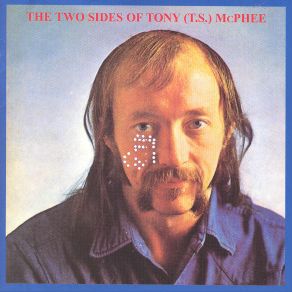The Two Sides Of Tony (T.S.) McPhee
Download links and information about The Two Sides Of Tony (T.S.) McPhee by T. S. McPhee. This album was released in 1973 and it belongs to Rock, Blues Rock, Hard Rock, Heavy Metal, Psychedelic genres. It contains 6 tracks with total duration of 38:20 minutes.

|
|
|---|---|
| Artist: | T. S. McPhee |
| Release date: | 1973 |
| Genre: | Rock, Blues Rock, Hard Rock, Heavy Metal, Psychedelic |
| Tracks: | 6 |
| Duration: | 38:20 |
| Buy it NOW at: | |
| Buy on iTunes $9.99 | |
| Buy on Amazon $5.34 | |
Tracks
[Edit]| No. | Title | Length |
|---|---|---|
| 1. | Thre Times Seven | 3:13 |
| 2. | All My Money, Alimony | 3:00 |
| 3. | Morning's Eye | 4:48 |
| 4. | Dog Me,Bitch | 2:48 |
| 5. | Take It Out | 5:23 |
| 6. | The Hunt | 19:08 |
Details
[Edit]Aptly titled, Two Sides of Tony McPhee not only explores McPhee's conceptions about love, relationships, religion, and aging, but the album is divided up musically, showcasing his talent as both a guitarist and a keyboard player. After displaying his keenness for composing a concept album with Split, a piece that he recorded with his band the Groundhogs based on the complexities of schizophrenia, McPhee decided to record an album that was more exclusive and personal. The result was Two Sides of Tony McPhee, with McPhee playing an acoustic and electric guitar for the first four tracks, then switching to three different synthesizers and an electric piano for side two, a lengthy spoken poem entitled "The Hunt." What results is an extremely entertaining and engrossing conceptual production that is equal to anything he's done with the Groundhogs. McPhee's writing is penetrating and resonant, unleashing his thoughts on the transcendence of life ("Three Times Seven"), the bitterness of failing relationships ("All My Money Alimony"), the pain of loss ("Morning Eyes"), and pure anger ("Don't Dog Me Bitch"), with each song accompanied by the guitar and nothing else. The second half of the album is comprised of "The Hunt," which is just as esoteric and sagacious as it is long and opens up with the ARP 2600 synthesizer mimicking an eerie, echoed howl of a dog in the distance. McPhee bellows and rants in a penetrating manner about the unethical nature of war and humankind's inhumanity throughout the ages, switching ever so smoothly to his abstract philosophies about the corruption of power and the mystery of fate, life, and death. Not only is his poetry forceful, but the overlapping of the electric piano and drum synthesizer shroud the piece with an ornate progressive ambience, adding a deeper sense of intrigue to his words and creating a rather bizarre electronic climate. The entire album is riveting, and Two Sides of Tony McPhee hinted at McPhee's fondness for progressive rock, an area in which he eventually led the Groundhogs into with their next few albums. Although this album has been eclipsed by what McPhee has accomplished with his band, its revelations about McPhee as a musician and a philosopher are quite gripping, and this is a must-hear for all Groundhog fans.